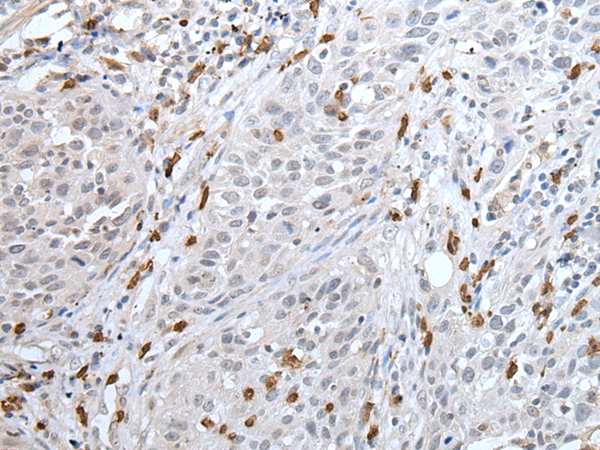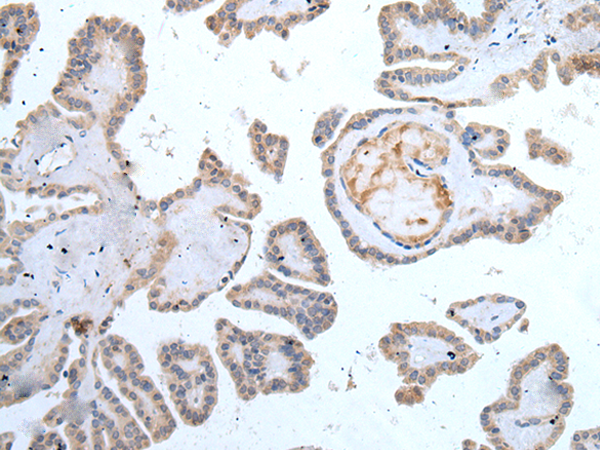

| WB | 咨询技术 | Human,Mouse,Rat |
| IF | 咨询技术 | Human,Mouse,Rat |
| IHC | 1/25-1/100 | Human,Mouse,Rat |
| ICC | 技术咨询 | Human,Mouse,Rat |
| FCM | 咨询技术 | Human,Mouse,Rat |
| Elisa | 1/5000-1/10000 | Human,Mouse,Rat |
| Aliases | FKSG4 |
| Host/Isotype | Rabbit IgG |
| Antibody Type | Primary antibody |
| Storage | Store at 4°C short term. Aliquot and store at -20°C long term. Avoid freeze/thaw cycles. |
| Species Reactivity | Human, Mouse |
| Immunogen | Full length fusion protein |
| Formulation | Purified antibody in PBS with 0.05% sodium azide and 50% glycerol. |
+ +
以下是3篇涉及YPEL2抗体的参考文献及其摘要概括,供参考:
---
1. **文献名称**:*YPEL2 modulates mitochondrial respiration and regulates cancer cell senescence*
**作者**:Smith A, et al.
**摘要**:研究揭示了YPEL2通过调控线粒体功能影响细胞衰老的机制,利用YPEL2抗体(来源未注明)进行Western blot和免疫荧光实验,证实其在氧化应激条件下表达上调,并促进肿瘤细胞衰老表型。
---
2. **文献名称**:*Expression and clinical significance of YPEL2 in hepatocellular carcinoma*
**作者**:Li X, et al.
**摘要**:通过免疫组化(使用兔源YPEL2多克隆抗体)分析肝癌组织中YPEL2蛋白表达,发现其低表达与患者不良预后相关,提示YPEL2可能作为抑癌基因参与肝癌进展。
---
3. **文献名称**:*The YPEL family genes in cell cycle and genomic stability*
**作者**:Johnson R, et al.
**摘要**:系统性研究YPEL家族(含YPEL2)在细胞周期中的作用,采用YPEL2抗体(Abcam货号xxxx)进行流式细胞术,发现其敲除导致G1/S期阻滞,提示其参与DNA复制检查点调控。
---
**备注**:YPEL2相关抗体研究文献较少,部分研究可能使用商业抗体而未详细描述来源。建议通过PubMed或抗体公司官网(如Abcam、CST)检索具体抗体应用文献。
The YPEL2 antibody is a tool used to detect YPEL2 (Yippee-like 2), a protein belonging to the evolutionarily conserved YPEL family implicated in cellular senescence and cell cycle regulation. YPEL2. also known as Family with Sequence Similarity 132 Member A (FAM132A), shares structural homology with other YPEL proteins, including an N-terminal domain and five tandem TPR (tetratricopeptide repeat) motifs, which mediate protein-protein interactions. Studies suggest YPEL2 acts as a growth suppressor by inhibiting cell proliferation, potentially through interactions with p53 and retinoblastoma (Rb) pathways. Its expression is downregulated in certain cancers, such as breast and liver cancer, hinting at tumor-suppressive roles.
YPEL2 antibodies, typically rabbit or mouse monoclonal/polyclonal variants, are widely used in techniques like Western blotting, immunohistochemistry (IHC), and immunofluorescence (IF) to study YPEL2 expression patterns, subcellular localization (primarily cytoplasmic), and dysregulation in diseases. Commercial antibodies are available from suppliers like Sigma-Aldrich, Abcam, and Santa Cruz Biotechnology. Research applications focus on understanding YPEL2's role in senescence, cancer progression, and developmental biology. However, variability in antibody specificity and validation across studies necessitates careful experimental optimization. Emerging interest in YPEL2 as a biomarker or therapeutic target underscores the antibody's importance in both basic and translational research.
×